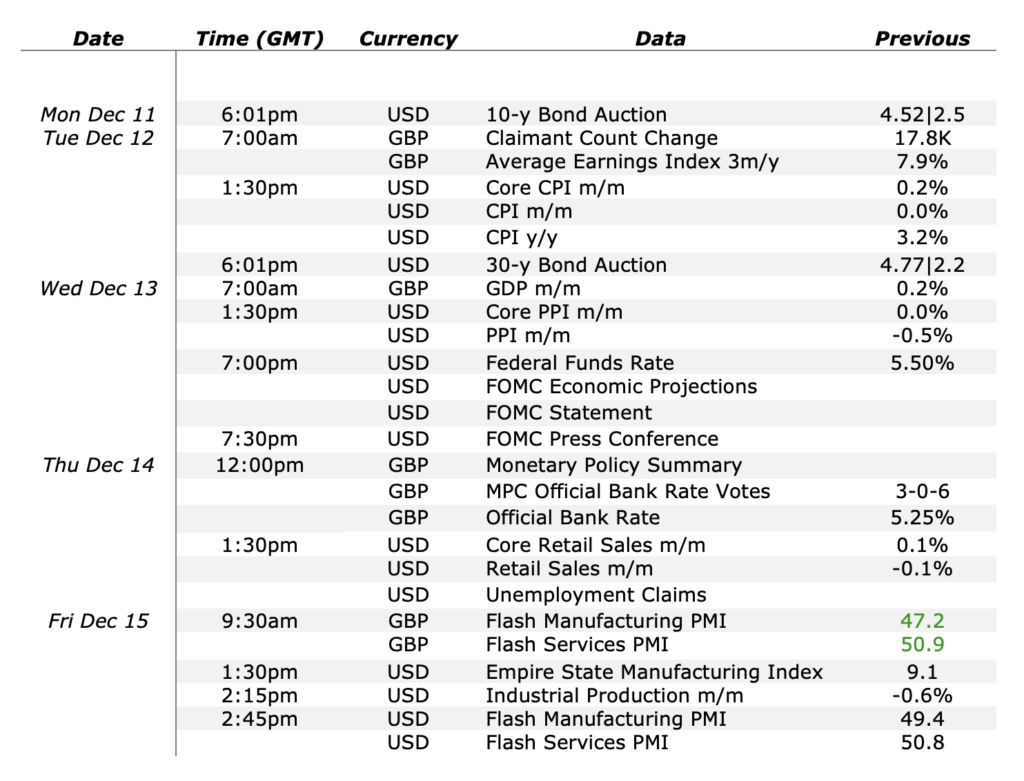GBP/USD Faces Stern Test: NFP, CPI, FOMC, BoE on the Horizon

GBP/USD Faces Stern Test: NFP, CPI, FOMC, BoE on the Horizon
The GBP/USD is poised for a significant challenge in the upcoming days, spanning the end of this week and much of the next. Anticipation surrounds key data releases from both the UK and the US, with the US nonfarm payrolls report on Friday and CPI data on the horizon. Moreover, the Federal Reserve and the Bank of England are set to announce their respective interest rate decisions next week. While the outcome of these macro events could shape the direction for the GBP/USD, it’s worth noting that the cable has closely mirrored stock market movements. November witnessed a surge in both the popular currency pair and major indices. Despite a recent pause in US indices this month, the DAX continues to climb to new highs. The enduring bullish trend in stocks, once profit-taking subsides, may see the GBP/USD resume its upward trajectory, regardless of short-term volatility induced by upcoming macro events.
Dollar finds resistance ahead of key US data
Following a positive beginning to the week, the Dollar Index (DXY) fell in the early European session on Thursday, slipping below the 104.00 mark. The majority of the DXY’s downturn was attributed to the Japanese yen, which surged across the board after BoJ Governor Ueda’s meeting with PM Kishida. This sparked speculation that the BoJ might consider ending its negative interest rates policy.
Setting aside the USD/JPY pair, the dollar’s losses against other currencies were relatively modest. In general, the greenback maintained a holding pattern, and its future trajectory may depend on the upcoming US jobs report, as well as the CPI data and FOMC meeting in the following week.
The signals from FX and bond markets this week suggest that investors are incorporating the likelihood of a subdued NFP figure, implying the potential for a stronger dollar if the data doesn’t prove excessively weak. However, given the significant improvement in risk appetite in recent months, any noteworthy dollar rally may be countered in favour of the pound and other more risk-sensitive currencies, particularly, commodity dollars.
The GBP/USD is likely to remain in a holding pattern ahead of more significant events starting Friday with the release of the US non-farm payrolls report. The US dollar was relatively unscathed earlier this week, following Tuesday’s conflicting US data releases. The unexpected drop in JOLTS job openings for October fuelled speculation of potential future Fed rate cuts, but the more current and stronger-than-expected ISM services PMI data for November provided a counterbalancing effect. Wednesday’s unveiling of weaker ADP private payrolls data did not immediately trigger a dollar sell-off until Thursday’s yen-inspired drop. As we head towards the end of the week, it looks like the dollar may have started a new down leg, which could be good news for the GBP/USD.
GBP/USD set for a big test next week
The GBP/USD faces a big week next week, with several data releases from both sides of the pond to come while the Federal Reserve and Bank of England will be making their respective interest rate decisions. Here’s the full economic data calendar relevant to the GBP/USD pair:

The dollar’s resurgence earlier this week was attributed in part to comments by Federal Reserve chair Jerome Powell on Friday when he pushed back on rate-cut bets. However, he did say that interest rates were sufficiently restrictive, suggesting that peak rates have been reached, as per market expectations. As there will be no further updates from Federal Reserve officials until the conclusion of the next FOMC meeting on December 13, incoming data releases will provide the main source of direction for the dollar, and thereby the GBP/USD, in the interim.
Next up is the nonfarm payrolls data on Friday. In the last 5 months, we have seen 3 misses in the headline jobs growth, a sharp contrast to the previous 14 occasions when we saw repeated beats. The recent weakness in jobs growth, although not alarming by any means, suggests that the jobs market is cooling. This has also been highlighted in other measures of the labour market, with jobless claims rising more than expected and the unemployment rate edging higher. If we get a rather weak number this time, then expectations over a sooner-than-expected rate cut could send the dollar lower again. A headline print of 185K is expected this time, compared to 150K the previous month. Watch out for revisions.
GBP/USD technical analysis
The higher highs and higher lows ever since the GBPUSD bottomed out in October means the path of least resistance is still to the upside for the cable. In the middle of November, the pair moved above the 200-day average to provide us with an objective indication that the trend had turned positive. So, I would be inclined to look for bullish setups to emerge around key support levels such as 1.2550 and 1.2500. These levels were previously resistance. The line in the sand for me is around 1.2450, which was the last low prior to the latest rally. A move below 1.2450 would create a lower low and thus a bearish reversal signal. We will cross that bridge if and when we get there. For now, a rebound towards 1.2600 area looks the more likely outcome.

Source: TradingView.com
Trader | Analyst | TradingCandles.com
e: Fawad.Razaqzada@TradingCandles.com
20231207











